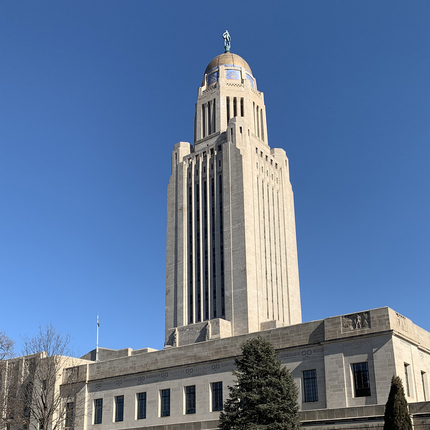By Tim Mussack, former staff member
The Watchful Citizen
“The salvation of the state is in the watchfulness of the citizen.” —Hartley Burr Alexander
Last week saw the introduction of more than 200 new bills and resolutions. This week senators began debate on priority bills that have been carried over from the 2021 session. New bills will continue to be introduced this week as well.
We value your input as we engage with the legislative process. If you would like to share your support, concerns, insights or opposition by providing testimony in-person, via letter or by visiting with your senator, please do not hesitate to contact me at [email protected] or 402.687.2100 ext. 1032.
Food and agriculture
Legislative Bill (LB) 755 (Brandt)—Support: This Center for Rural Affairs legislation, introduced by Sen. Tom Brandt, would provide $10 million for the Independent Processor Assistance Program, which was established last year with the unanimous passage of LB 324. Funding would come from State Recovery Funds from the federal American Rescue Plan Act. This bill would help local processors secure additional space, equipment, and staffing to keep up with the demand created by changing consumer preference and work interruptions at regional packing plants. That is especially important to livestock producers, who continue to have a difficult time scheduling locker dates.
Are you a livestock producer whose business has suffered due to locker limitations? If you would like to help support this bill, please contact me at [email protected] or 402.870.2681.
LB 783 (Groene)—Support: Appropriates $75 million in State Recovery Funds from the federal American Rescue Plan Act to the Nebraska Department of Economic Development. The funding will be used to create a grant program to aid in the creation of beef slaughter and packing plant facilities. This is likely in connection to a new large-scale facility proposed for the North Platte area. Supporting livestock producers with more and geographically-diverse processing capacity is a good thing for the state.
Health and safety
LB 697 (Kolterman)—Support: This bill provides for licensure of Rural Emergency Hospitals (REH). In December 2020, Congress passed the Consolidated Appropriations Act of 2021, which created a new Medicare provider type called the Rural Emergency Hospital. The REH will be a new rural hospital type that does not provide inpatient care, rather 24-hour emergency services. The REH comes as a response to an ongoing period of hospital closures in rural communities and to address the concerns about access to emergency services in rural areas. Rural health outcomes are important to the Center and we believe REHs can help fill the gap our communities need when responding to medical emergencies.
Education
LB 721 (Hilkemann)—Support: Appropriates $60 million in State Recovery Funds for the University of Nebraska Medical Center Rural Health Complex. This new facility will be located on the campus of the University of Nebraska at Kearney and will focus on educating health care professionals who will work in rural hospitals and clinics. The Center supports this bill because we believe it will help in the recruitment and retention of rural health care professionals.
LB 758 (Brandt)—Support: Amends the Nebraska Farm-to-School Program Act to include early childhood education programs. Created last year under LB 396, this statewide program is administered by the Nebraska Department of Education. It promotes connections between local farmers and schools to procure fresh, locally grown food for school meals. In the interest of providing students with fresh, healthy food and opening a new market to local producers, the Center supports this bill.
Economic development
LB 759 (Dorn)—Support: This Center for Rural Affairs legislation, introduced by Sen. Myron Dorn, would increase the maximum amount of a microloan under the Business Innovation Act to $150,000. Our work during the 2020 and 2021 legislative sessions helped solidify funding for Business Innovation Act (BIA) programs. Allocations to the Microenterprise Assistance Program, a BIA initiative focused on the state’s small businesses, have increased to $1 million annually. Current statute limits the size of loans made with Microenterprise Assistance Program funding to $100,000 or less. Last updated in 2015, this limitation often requires lending organizations to find secondary sources of funding to complete a business loan.
Other bills we are monitoring
LB 760 (Dorn): Appropriates federal funds to the Nebraska Department of Health and Human Services for grants to licensed emergency medical services programs.
LB 775 (Brewer): Prohibits land disposal of wind turbine blades and their component parts.
LB 806 (Bostelman): Change provisions relating to drainage of land by the landowner.
LB 838 (Kolterman): Requires the Nebraska Department of Education to create an aid program relating to the early childhood workforce.
LB 890 (Walz): Changes the Tax Equity and Educational Opportunities Support Act (TEEOSA). The changes would provide school districts with money for each student, boost the share of income tax going to school districts and lower property tax levies.
LB 891 (Lindstrom): Change the distribution of sales tax revenue, school levy limitations, and other tax and school provisions.
LB 916 (Wayne): Adopts the Rural Municipal Broadband Access Act.
LB 925 (Gragert): Adopts the Resilient Soils and Water Quality Act and state intent regarding appropriations.
LB 929 (Wishart): Require submission of a Medicaid state plan amendment or waiver to extend postpartum coverage to 12 months.





